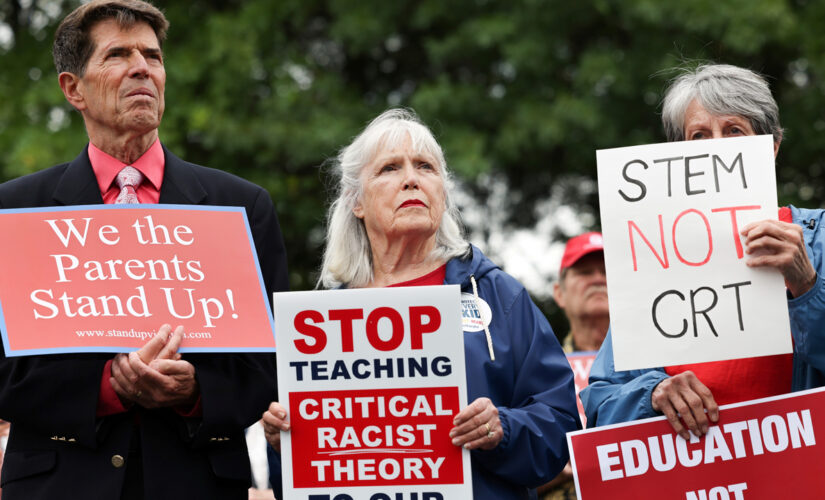NEWYou can now listen to Fox News articles!
Just months after the National School Boards Association sent President Biden a Sept. 29 letter that likened parents to domestic terrorists, the group has been torn apart and is facing a challenge from a new organization that might replace it.
The letter and the decision by Attorney General Merrick Garland to direct the FBI and U.S. attorneys to address the matter sparked an uproar among parents, activists and GOP political leaders who saw an attempt afoot to intimidate citizens into not speaking up at school board meetings on issues like masking and the teaching of critical race theory.
U.S. President Joe Biden is seen before giving remarks in Statuary Hall of the U.S Capitol on Jan. 6, 2022 in Washington, D.C. (Greg Nash-Pool/Getty Images)
According to the Washington Post, 19 states, most led by Republicans, have either quit the group or promised to do so once their membership is up. Six of the 19 people on the NSBA board have left. And several states are in talks to form a rival organization, to be called the Consortium of State School Boards Associations. Efforts by the NSBA to get dissenting states to change their minds have come up empty.
HOW SCHOOL BOARD MEETINGS TURNED INTO A BATTLEGROUND OVER AMERICA’S KIDS IN 2021
Citing an increase in “acts of malice, violence, and threats against public school officials,” the letter stated that “the classification of these heinous actions could be the equivalent to a form of domestic terrorism and hate crimes.” It pleaded for help from a variety of federal agencies, including the FBI Counterterrorism Division.
Heather Fruzzetti makes a public statement as people protest different issues, including the board’s handling of a sexual assault that happened in a school bathroom in May, vaccine mandates and critical race theory during a Loudoun County School Board meeting in Ashburn, Virginia, on Oct. 26, 2021. (REUTERS/Leah Millis)
There have been suggestions, particularly given the speed of the response by the attorney general, that the letter was cooked up by the Biden administration. Both the White House and the Department of Education Secretary Cardona have denied allegations that they solicited it.
Loudoun County School Board meeting protest (Reuters)
On Oct. 22, the NSBA issued a letter to its members acknowledging that “there was no justification for some of the language included” in the earlier missive. But it hasn’t been enough to quell the rebellion.
CLICK HERE TO GET THE FOX NEWS APP
Now a newly-installed NSBA executive director is hoping to persuade states to change their minds and return.
“I hope they’ll give us a chance,” John Heim told the Post in an interview.




